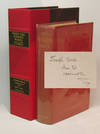
Circa 1845 - Wood engraving of the Quarantine Station and Marine Hospital for emigrants at Staten Island, New York
- Used
- very good
- Condition
- Very good
- Seller
-
Virginia Beach, Virginia, United States
Payment Methods Accepted
About This Item
This wood engraving clipped from an unidentified edition of the Illustrite Zeitung (Illustrated Newspaper), known colloquially as the 'Leipziger,' is undated, but information on the reverse indicates that it was published by J. J. Weber of Leipzig, Germany. It is titled, Quarantine und Marinehosital fur Einwanderer auf Staten Island, Newyorf (Quarantine Station and Marine Hospital for Immigrants at Staten Island, New York). It is in nice shape with some light toning.
It can be dated as locations of the buildings and dock exactly as shown almost identically match those shown on a map of the grounds, "Marine Hospital Ground, Staten Island . . . made by John Ewein. Dated March 1845 . . . City Surveyor." The large building in the foreground is "[St. Nicholas] Hospital." The center building on the hill is the "Yellow Fever Hospital." The building to the far right is the "Small Pox Hospital." The small buildings on the "Wharf" and "Pier" are a "Shed" and "Store House."
Between 1795 and 1798, Yellow Fever killed thousands in New York City, spurring passage of a quarantine law that funded the construction of the New York Marine Hospital on this site. At its peak, the hospital could house 1,500 patients and was treating more than 8,000 per year. Before landing at New York, all vessels were boarded by inspectors, and if they found any trace of disease, everyone was unloaded at the Quarantine. First-class passengers spent their quarantine at the St. Nicholas while lower-class passengers were held in shanties not visible in the wood engraving.
There was considerable local opposition to the hospital, both from land developers who wished to use the grounds for projects and locals who blamed outbreaks of disease on the passengers under quarantine. The tension escalated and in 1856, a local health board prohibited anyone, including staff, from exiting the building by land. On the first of September 1858, the same board passed a resolution declaring the facility to be "a pest and a nuisance of the most odious character, bringing death and desolation to the very doors of the people [who must abate] this abominable nuisance without delay." That night a giant mob attacked the hospital, and after evacuating patients and staff from the buildings, burned most of the complex to the ground. The following night, they burned the rest. When later brought to trial, the mob leaders were acquitted, the jury deciding that they had acted in self-defense.
. In his semi-autobiographical novel, Redbun: His First Voyage, Herman Mehlville recounts a typical chaotic scene as ships were searched and inspected by health officials and later expresses relief when upon returning to New York harbor as his ship passed the Staten Island complex, apparently unnoticed by port officials, and escaped inspection.(For more information, see Stephenson's "The Quarantine War: the Burning of the New York Marine Hospital in 1858" in the Jan-Feb 2004 issue of Public Health Reports, available online.)
Uncommon. Wood engravings of the Staten Island hospital from illustrated magazines and auctions occasionally appear at auction. The majority are post-attack illustrations showing the ruins or replacement buildings.
.Reviews
(Log in or Create an Account first!)
Details
- Bookseller
- Kurt A. Sanftleben, LLC
(US)
- Bookseller's Inventory #
- 010201
- Title
- Circa 1845 - Wood engraving of the Quarantine Station and Marine Hospital for emigrants at Staten Island, New York
- Format/Binding
- Disbound
- Book Condition
- Used - Very good
- Quantity Available
- 1
- Publisher
- Illustrite Zeitung (Illustrated Newspaper)
- Place of Publication
- Leipzig, Germany
- Date Published
- 1845
- Bookseller catalogs
- History; Transportation;
Terms of Sale
Kurt A. Sanftleben, LLC
Sales tax of 6% required for books shipped to addresses in Virginia. Standard domestic shipping is free, however additional fees may be required for heavy, oversized, or unusually-shaped items.
Returns accepted for any reason for a full refund (less shipping) if we receive the return within 14 days of shipment and items are received in the same condition as sent. Advance notice of any return would be appreciated.
About the Seller
Kurt A. Sanftleben, LLC
About Kurt A. Sanftleben, LLC
We also have a nice selection of unusual ephemera and postal history items in stock as well.
Member: Antiquarian Booksellers Association of America, Ephemera Society, Manuscript Society, American Stamp Dealers Association, American Philatelic Society, U.S. Philatelic Classics Society, Military Postal History Society
Glossary
Some terminology that may be used in this description includes:
- New
- A new book is a book previously not circulated to a buyer. Although a new book is typically free of any faults or defects, "new"...

